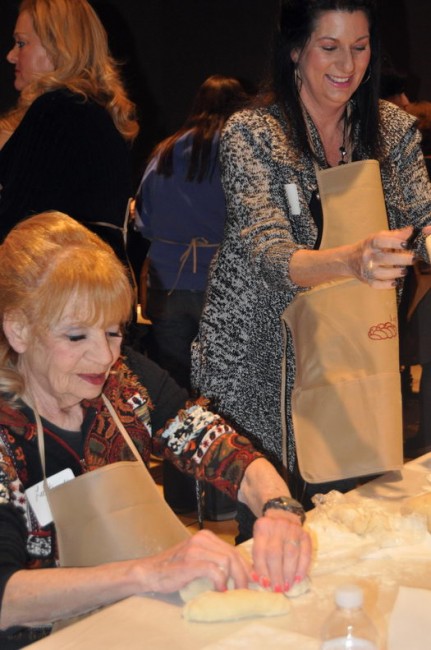
Dallas Women ‘Bake a Difference’
Chabad of Dallas inspired the perfect recipe for more than a loaf of bread, the 1st Annual Let’s Bake a Difference, an evening of friendship, consideration, education, and caring for others.
At the gathering of close to 400 women of four generations from throughout the Jewish community, prayers were said for healing, and bread loaves were braided of love.
“It’s mind-boggling the togetherness and the absolute joy that is building in this room,” said Baila Dubrawsky, the Rebbetzin of the Chabad of Dallas community, who originated the idea of a community bake knowing of many in the community who were ill, or who were connected to those needing prayers of support. “Whatever door I knocked on, it opened, and the excitement and support for this has been really remarkable.”
“This is a catalytic happening, because just as yeast catalyses flour to produce bread which sustains mankind, so too the unprecedented outburst of participation by so many must bring eternal benefits and blessings to us all,” said Dubrawsky, who has five daughters. “As mothers of our great Jewish People, it is up to us to maintain the true golden tradition set out by our mothers and grandmothers who retained their loyalty to Judaism and in whose merit we are here.”
“What an incredible opportunity to think of others. This is just amazing. What’s beautiful is to see the cross-section of the women of our community, from different congregations, schools, and organizations,” said Lizzy Greif, who co-chaired the event with Dubrawsky and Sue Fox Schwartz.
For Greif, who created gift bags, each with an apron, booklet with prayers and recipes, and two Sabbath candles, the timing of the event was caringly coincidental. The evening marked the twelfth anniversary of the passing of her sister Margot Pulitzer, after a strong and courageous battle against cancer, as well as the birthday of her mother, Ann Rosenberg. “I can’t think of a better way to remember my sister, than to empower a diverse group of women, to share in an ancient tradition, all in the name of a mitzvah.”
Before the women collectively began braid the loaves, a moment of silence was held to think of those anyone knew in pain, with the recitation of tehillim, prayers from the Book of Psalms. During the braiding process, each loaf was removed of an egg-sized piece of dough to be burned during the baking – the designated portion given to G-d, through the Temple priests, in ancient times. The custom is a reminder that nourishment comes from G-d, transforming the baking of bread into a spiritual act.
“If you think about when G-d created the world he gave of Himself and manifested part of Himself in the many different things He created,” said co-chair, Sue Fox Schwartz, “in sunsets and in flowers, in mountains, in oceans, and in everything that comes along with the concept of creation and His part as creator? That He gave to the woman.”
“The woman is the one who is symbolic of ‘the creator,’ as she has the capacity to make something from nothing,” said Fox Schwartz. “We’re able to take raw materials and develop them into something perfect. Think about an example from the basics of human existence, taking seed that develops into an actual child. With challah, we also take raw materials, ingredients inedible on their own, that when we bring them together, we can perfect.”
Ingredients for the more than 600 pounds of dough; 500 pounds of flour, 400 eggs, six pounds of yeast, 25 quarts of oil, 69 pounds of sugar, and one-third of a pound of salt were combined in a commercial mixer donated by Harold Gernsbacher and his daughters, to honor the memory of their wife and mother Toni, who first connected to Chabad through a challah baking class. Greif, her husband Jules, Dana and Ari Feinstein, and an anonymous donation in memory of Jonathan Frid, were among those who helped to underwrite the event.
The recipe ultimately provided for approximately 613 loaves (coincidentally the number of commandments in the Torah), which were sent home with the ladies to bake. Each table had baking “coaches,” as many of the women regularly bake challah in their own homes and others for whom this was a first-time experience.
“The coming together of all of these women is the manifestation of a mitzvah,” said Chabad of Dallas’ Rabbi Mendel Dubrawsky. “It is the essence of ‘Jewish feminism,’ the women of our community to take ingredients, and turn them into gratitude for Hashem (G-d). That’s to be celebrated.”
“If it’s true that as an individual woman is heard by Hashem as she bakes, and prays as the gates to heaven are open,” said Rabbi Dubrawsky, “imagine the power and energy of hundreds of women in this room. Certainly the heavens are showering with joy and blessings.”
















Dallas
I see my Rebbetzin! Love you Rebbetzin Dubrawsky! You are the light of our community!
Wonderful!
What a blessing!
WWW
Who can I call for details I would love to do the same program in our community